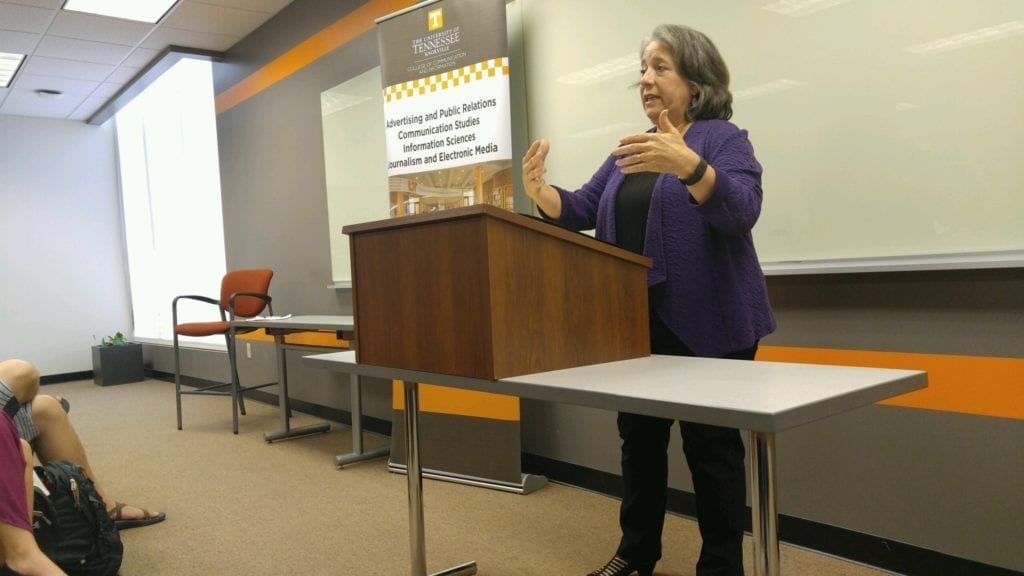Rogero addresses diversity, inclusiveness at UT
Mayor Madline Rogero addressed students of the College of Communication and Information Wednesday night, promoting diversity and inclusion as both an economic and ethical choice.


Knoxville Mayor Madeline Rogero brought her own message of diversity to the students of College of Communication and Information at UT in Diversity and Inclusion Week’s second keynote address.
Rogero’s commitment to diversity dates back to her 2011 campaign for mayor.
“We built our campaign on diversity and inclusiveness, and I promised at my inauguration that that’s how we would govern,” Rogero said. “I knew that if I was elected, I wanted to be the representative of all the people in our city, including those who too often have not had a voice or a seat at the table.”
Rogero told the students that her mission to promote inclusion in Knoxville is not just a moral choice, but an economic one.
“If you look at where the real economic growth is happening in our state, it’s primarily in and around metropolitan areas, Memphis, Nashville, Knoxville, Chattanooga,” Rogero said. “These are the places that are attracting investment and attracting people to stay here and to move here. We want all kinds of people. I know all four of us mayors of those cities, we want all kinds of people to feel at home here in our cities and in our state.”
“As a community and as a society, we all benefit when everyone is able to bring their ideas and their strengths into the mix,” Rogero said.
Rogero described the ways she has worked as mayor to bring those different strengths and ideas into Knoxville’s mix.
Rogero herself is, as Knoxville’s first female mayor, as testament to inclusion. For the past six years, Rogero has expanded employment protections and benefits for LGBT citizens of Knoxville..
Rogero has maintained Knoxville Police Department’s practice of not asking citizens about their immigration status, and she is a vocal supporter of comprehensive immigration reform at the federal level.
Her office works to address what she calls “serious and longstanding racial disparities in Knoxville, similar to many around our country,” by working to increase the ethnic diversity of city employees and law enforcement, as well as training officials to be sensitive to the needs of diverse communities.
“We are very intentionally working to increase the diversity of our law enforcement,” Rogero said.
Rogero also has a Mayor’s Council on Disability Issues, which are held on the second Wednesday of the month.
“Their whole job is to advise me, to advise our staff on how we can make our city more accessible,” Rogero said.
Rogero credits past experiences with giving her a heart for issues of diversity.
Rogero was raised in Florida when segregation was prevalent. She said the only diversity she knew growing up was there were Protestants.
However, Rogero never remembers hearing her parents use racial slurs or speak negatively about groups different from them. Like many, Rogero was exposed to diversity in high school and college, and during her three years as an activist for the National Farm Workers Association.
“I think that we have veils, you know?” Rogero said. “We’re kind of born with all these veils in front of us, and every experience you have pulls back its own veil, and your vision gets a little more clear and a little more aware. That’s how I see my life. I’ve been fortunate to have that.”
Rogero has applied that clearness of vision to Knoxville.
“I approach diversity and inclusion foremost as a matter of heart and soul, something that’s very deep and personal to me. It’s the right thing to do, it’s my moral and ethical compass,” Rogero said. “Whether you approach diversity and inclusion from a practical and economic perspective or because you’re driven by your heart and soul, we all have a very important role to play.”
The sentiment that promoting diversity is the ethical thing to do is shared by Michael Wirth, Dean of the College of Communication and Information.
Wirth said it is an especially important message for the students of his college.
“Whether you’re in media or not, it’s the right thing to do,” Wirth said. “But if you’re going to go out and cover the world, you better have some insights into what that world is all about and who else is in that world besides people like you and me.”
For Aubrey Mullins, a senior in the college, Rogero’s message was an encouraging one.
“I think that she is an incredible leader, and that she gave a really encouraging message, not only to students but to a community,” Mullins said. “She spoke so much truth about the fact that there is a great deal of hatred…I think that it rings very true what she said, [that] being the one person that chooses to be a light in that kind of darkness makes a huge difference, and it goes a long way, especially as somebody in her position.”
It was on that note of light that Rogero ended her address to the students.
“I believe we are all entrusted with an opportunity and indeed an obligation to leave Knoxville a better place than we found it,” Rogero said. “A stronger, safer, healthier and more equitable city.”
Featured Image by Joe Blackstock
Edited by Kaitlin Flippo

